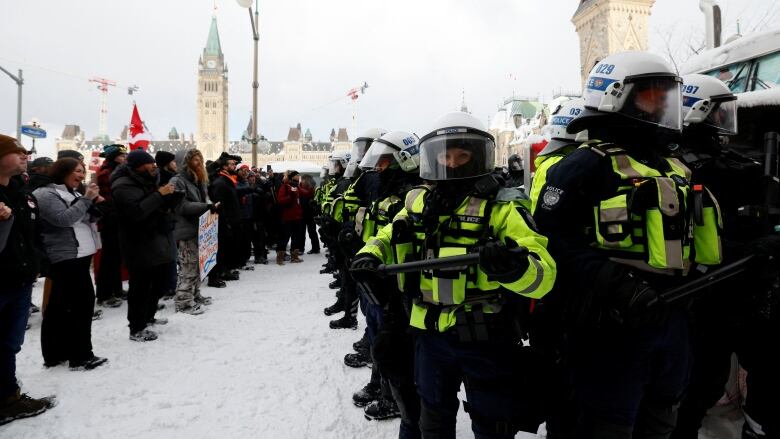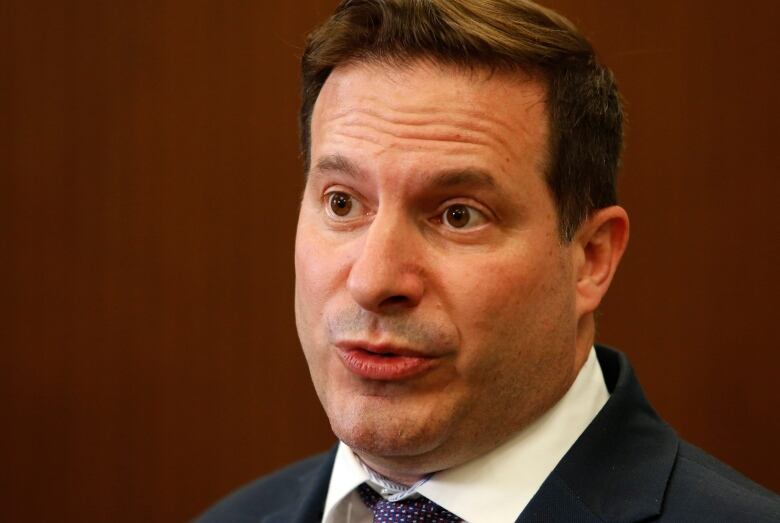Cabinet told of possible 'breakthrough' with protesters night before Emergencies Act was invoked
Public safety minister says reference was to failed negotiations led by City of Ottawa

On the night before Justin Trudeau took the historic step of invoking the Emergencies Act during last February's Freedom Convoy occupation of Ottawa, the prime minister's national security and intelligence adviser told cabinet there was "potential for a breakthrough," court documents reveal.
The office of Canada's public safety minister says the adviser was referring to negotiationsled "principally" by theCity of Ottawa that were"ultimately unsuccessful" after being"disavowed" by many associated with the convoy.
The disclosure about the potential breakthrough, contained in the summary of a cabinet meeting that took place on the evening of Feb. 13, 2022, comes in one of several heavily redacted documents recently filed in federal court. Civil liberties groups are legally challenging the government's use of the act, saying it went too far.
The Toronto Star first reported on the documents.
According to the cabinet meeting minutes, which are not a verbatim transcript, Jody Thomas the former deputy minister of national defence and one of Trudeau's top advisers told Trudeau and his assembled ministers that "law enforcement gains have been important and that there was potential for a breakthrough in Ottawa, Ontario."
EmergenciesAct invoked for 1st time in Canadian history
Protesters were rallying against pandemic restrictions and blocked neighbourhood access and main arteries around Parliament Hill by clogging the streets with trucks and other vehicles.
The next day, on Feb. 14, Trudeau invoked the Emergencies Act for the first time in Canadian history.
Doing so gave authorities sweeping temporary powers, including the ability to freeze the bank accounts and credit cards of protesters. Attending any event deemed an unlawful assembly, such as the Ottawa convoy protest, also became illegal.
The act also made it possible for officers from outside of Ontario to participate in the operation to end the protest.
The act went into effect immediately but the debate about its merits in the House of Commons and Senate stretched on even as police quelled the last remnants of the demonstration on Feb. 19. Trudeau revoked the act five days later.
Sections of the document made available in the court documents do not include any details about the possible breakthrough cited by Thomas on Feb. 13.
But according to the statement from Public Safety Minister Marco Mendicino'soffice,the adviser was referring to negotiations led by the City of Ottawa.

On Feb. 13, the city announced it had come to an agreement with one of the leaders of the demonstration that would see hundreds of protest trucks to leave residential areas.
The city's talks were ultimately unsuccessful, Mendicino's office said.
"The government considered this as a factor in the decision to invoke the Emergencies Act," according to the statement.
"The situation remained volatile and the threat of future blockades remained. In Ottawa, there was a significant escalation in the boldness of the protestorsand stress that the city's 911 system was overloaded due to hoax calls."
Few trucks actually left as a result of the city's negotiations, though some ended up on Wellington Street already the noisy nucleus of the protest.One of the protest's leaders, Tamara Lich, cast doubt on whether such a deal had actually been made.
Weeks after the occupation ended, Thomas defended the decision to use the act, saying the protesters were "dug in" and "there's no doubt [they] came to overthrow the government."
'Lead federal negotiator' considered
The documents also shed light on other behind-the-scenes discussions among cabinet and other members of the government's Incident Response Group (IRG) during the Freedom Convoy.
In a meeting earlier in the day on Feb. 13, the group heard that blockades were at risk of causing "ongoing economic losses of 0.1 per cent and 0.2 per cent of gross domestic product" for every week they continued.
That same day, police dispersed a blockade of the Ambassador Bridge in Windsor, Ont., a key supply link between Canada and the U.S.
It was noted during the Feb. 10 meeting that "there is a broader challenge with law enforcement, some of whom may be sympathetic to the protestors' cause, resulting in reluctance to enforce."
Meeting minutes also show Ottawawas considering the appointment of a"lead federal negotiator" during the crisis. Publicly, Trudeau had spoken against the idea of personally meeting with convoy members.
Also on Feb. 10, Public Safety Canada reported that only a small minority five per cent of participants had a "strong devotion" to the protest in Ottawa, whereas 80 per cent had "a weak connection to the cause" and the remaining 15 per cent were "a swing factor."
"The negotiator suggested that the leaders of the protest could potentially be encouraged to leave and denounce the blockade in exchange for a commitment to register their message with the government," according to the minutes of that day's IRG meeting.
NDPflagstransparency concern
The New Democrats said the documents' disclosures reveal "a clear failure of the Liberals to be transparent with Canadians and Parliamentarians."
In a joint statement, MPAlistair MacGregor, the NDP's public safety critic, and MP Matthew Green, ethics critic, said the parliamentary committee that is studying the use of the Emergencies Act must have full access to documents.
"We are concerned by this government providing documents to the federal court that it refused to give the [committee]," they said.
The Conservative Party of Canada was also critical of the federal government in light of the disclosures.
"Minister Mendicino has already misled Canadians to justify the Liberal government giving itself unprecedented emergency powers,"Opposition House leader John Brassardsaid in a statement.
"This is further proof that the Liberal government's use of the Emergencies Act was about solving the Prime Minister's political problem rather than finding a peaceful and respectful resolution to the protests in Ottawa."
Philip Ling, Marina Von Stackelberg, Stephen Hoff, David Thurton, Aaron Wherry, John Paul Tasker















_(720p).jpg)


 OFFICIAL HD MUSIC VIDEO.jpg)
.jpg)



























































































